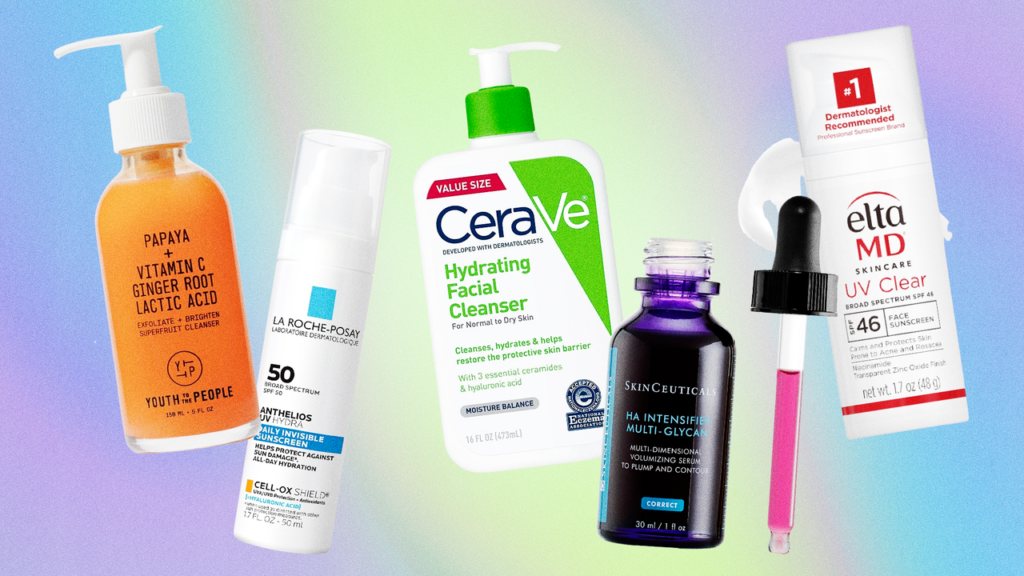For some people, the search for the best skin care products for dry skin often happens when they first feel the chill in the air—and while it’s also a sign that the holidays are coming, it also starts Countdown to dry and peeling skin.
“Dry skin is often a sign of a compromised skin barrier, which can lead to dry, itchy, or flaky skin,” says Dr. Mina Amin, MD, FAAD, a board-certified dermatologist in Los Angeles. The most common cause of dry skin is that the skin does not absorb enough moisture, which can be caused by a variety of factors such as aging, weather changes, frequent handwashing, or skin conditions.
Having dry skin means you need completely different products than someone with oily or combination skin. We’re not doctors, so we asked two dermatologists to walk us through how to create the best skin care routine for dry skin.
Dermatologists believe the best skin care products for dry skin
Best facial cleanser for dry skin
Best Exfoliant for Dry Skin
Best serums for dry skin
The best moisturizers for dry skin
Best sunscreen for dry skin
Best facial mask for dry skin
Best skin care routine for dry skin
The skin care routine of someone with dry skin or even sensitive skin doesn’t look much different than that of someone with other skin types. The basics are pretty much the same: cleanse, moisturize, protect, repeat. Variations between skin types depend on the types of products you use. For the most part, everything will hydrate your skin (even the stuff you use to cleanse), and everything is sure to leave you feeling hydrated, soft, and supple.
You do nothing but sleep at night, but natural facial oils will still accumulate on your skin, as will anything on your pillow that sticks to your face.
“Those with dry skin may not need to wash their face with a cleanser twice a day,” says double-certified dermatologist Dr. Brendan Camp, MD, FAAD. “Rinsing your face with water in the morning may be enough without putting your skin at risk of becoming too dry. Overuse of cleansers or oil-removing ingredients like salicylic acid can strip your skin of oils, leaving it prone to dryness.
However, if you do feel the need to do a full cleanse in the morning, Amin recommends using a mild cleanser in the morning and opting for a more foamy cleanser in the evening to “remove the sunscreen and give your nighttime routine a clean slate.” A fresh start. Just be sure to avoid using hot water, which can worsen dry skin. While some skin types can benefit from using a toner after washing, you can skip this step if you have dry skin.
Exfoliation is a vital step in your skin care routine, especially if you have dry skin, as it helps remove excess dead skin cells. The accumulation of these dead skin cells can lead to breakouts, and even dehydrated skin can still lead to acne, which is a skin problem that needs to be treated on its own. There are two types of exfoliation: chemical exfoliation and physical exfoliation. The former usually involves using acids to penetrate the skin to break down skin cells, while the latter uses physical exfoliants as abrasives to manually remove those dead skin cells that you would otherwise see peeling off.
People with dry skin may benefit more from chemical exfoliants, as chafing can irritate the skin and lead to increased sensitivity. If you’re going to use a physical exfoliant, just choose something gentle, not that harsh apricot scrub you used as an acne-prone teen. As Camp reiterates: “Use exfoliants sparingly to avoid irritating the skin and exacerbating dryness,” as exacerbation of dry skin can lead to eczema.
But after washing my face forward If you are moisturizing, consider using a serum. These are highly concentrated skin care products that provide your face with the extra needed benefits. “Apply a moisturizing serum, such as a hyaluronic acid serum, after washing your face to increase the penetration of moisturizing ingredients,” says Camp. You don’t need a ton of serum, usually just a drop or two to get the full effect, and they can really enhance the effectiveness of other skincare products you use on a daily basis.
Dry skin needs moisture, so it makes sense that moisturizer or lotion is probably the most important step in your daily care routine. Amin recommends using a “volumizing moisturizer,” which contains emollients, occlusive agents, and humectants like hyaluronic acid and glycerin to enhance skin’s moisture and plumpness. are all good, but may not be suitable for providing the nutrients dry skin needs. Additionally, being fragrance-free is key to avoiding skin irritation.
Anyone with skin, regardless of skin type, should wear sunscreen. In addition to harmful UV rays, sunlight can dry out the skin and worsen dryness. A good sunscreen can double as a second layer of moisturizer, but whatever you choose, we’re glad you’re using some SPF. Pro tip: Use sunscreen after your moisturizer (this goes for your morning skincare routine) so it acts as your outermost UV barrier when you’re exposed to the sun.
While not a necessity, a sheet mask can provide extra moisture to your skin and remind you to take a few minutes to sit down and enjoy your daily self-care routine. Hyaluronic acid is your friend, so find a mask that puts a lot of hyaluronic acid into your cup, because skin hydration is no joke.

